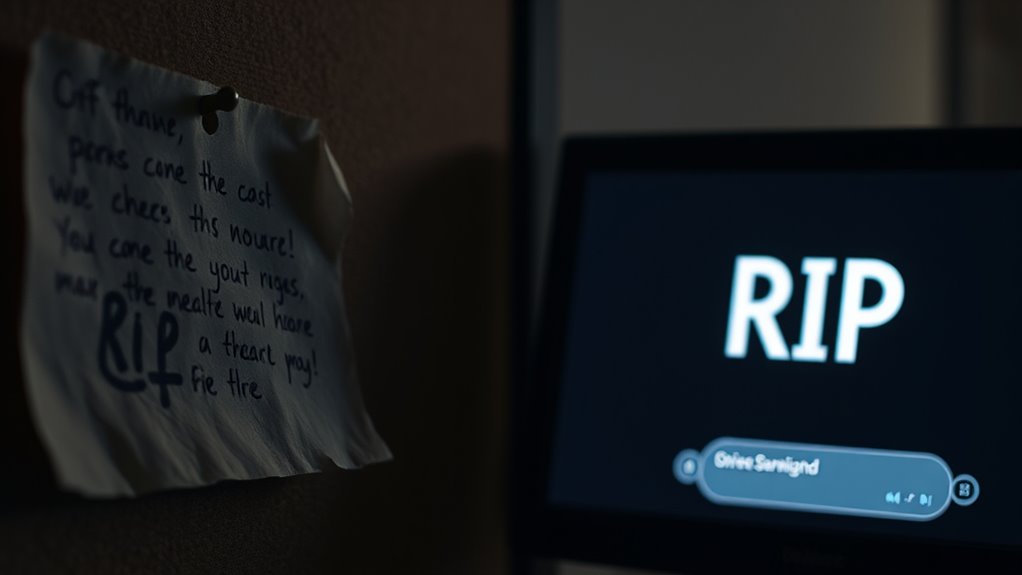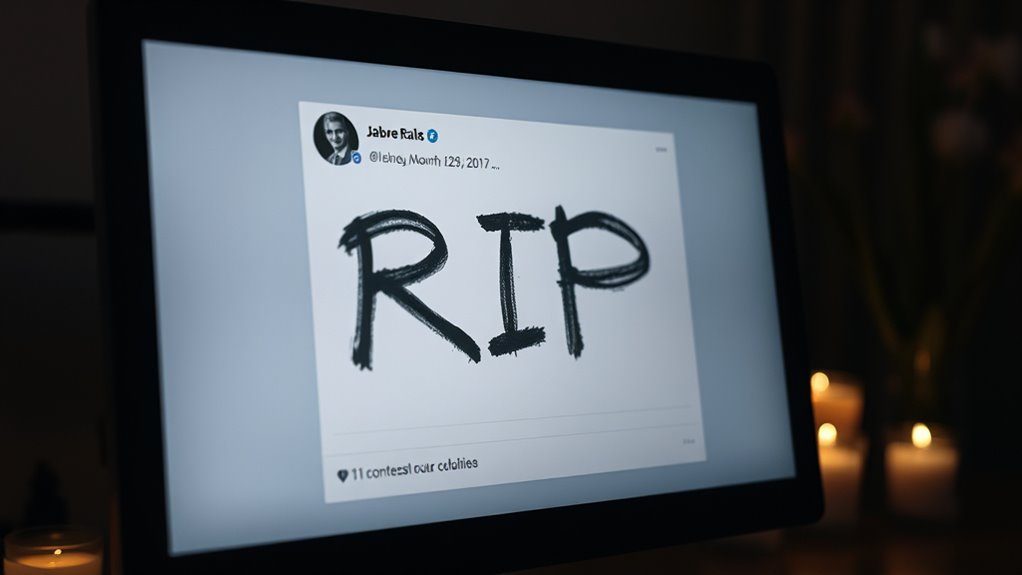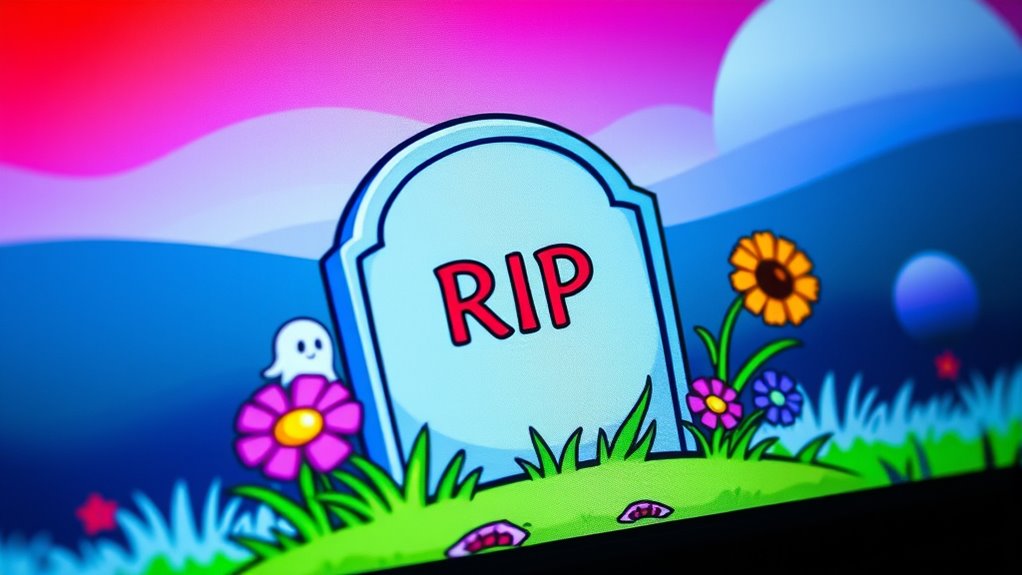RIP online stands for “Rest In Peace,” a phrase from Latin used to show respect and mourning for someone who has passed away. Today, you’ll see it in digital spaces to honor loved ones, but it’s also used humorously or sarcastically in memes and gaming. The meaning often depends on the context and tone, so if you want to understand how it’s used across different communities, keep exploring these variations.
Key Takeaways
- RIP stands for “Rest In Peace,” a phrase originally used to honor deceased individuals.
- Online, RIP is commonly used to express condolences, respect, or mourning for someone who has passed away.
- It can also appear in memes or gaming contexts to signify defeat, failure, or humorous loss.
- Variations like “RIPPED” or “RIP me” often convey humor, sarcasm, or meme culture rather than genuine mourning.
- Understanding the context and tone is essential to interpret whether RIP is sincere or playful online.
The Origin and Basic Meaning of RIP Online

RIP, which stands for “Rest In Peace,” originally comes from Latin phrases like “Requiescat in Pace” used in Christian prayers for the deceased. In digital communication, people adopted RIP as a quick way to express sympathy or acknowledge someone’s passing online. It’s become part of online etiquette to show respect and compassion in comments, posts, or messages. When you see RIP in a social media comment or a memorial post, it signals a simple yet meaningful gesture of mourning. Understanding its origins helps you recognize that, even in brief online exchanges, using RIP reflects cultural respect for the deceased. This practice bridges traditional mourning with contemporary digital communication, emphasizing the importance of kindness and proper online etiquette during sensitive moments. Additionally, recognizing the cultural significance of RIP helps foster empathy and understanding in online interactions related to loss.
RIP as a Sign of Mourning or Respect

When you see RIP used online, it often serves as a powerful sign of mourning or respect. People share digital tributes and messages to honor those who have passed, reflecting cultural significance across communities. These acts of respect through digital mourning help keep the memory of the deceased alive and show support for their loved ones. Utilizing sustainable practices in online memorials can also demonstrate a commitment to respectful and environmentally conscious remembrance.
Cultural Significance of RIP
Have you ever wondered why people use RIP to show respect online? It’s more than just a phrase; it’s a symbol of digital grief and honoring those who have passed. Using RIP in comments or posts helps create virtual memorials, allowing friends and strangers alike to express sympathy and solidarity. This practice reflects a cultural shift toward online mourning, where digital gestures hold real emotional weight. It fosters a sense of community and remembrance in the virtual space. Recognizing RIP as a sign of respect highlights how online interactions have evolved into meaningful acts of mourning. It’s a way to show empathy, connect across distances, and keep the memory of the deceased alive in the digital age. Additionally, understanding the cultural significance of RIP emphasizes how online expressions of grief serve to humanize digital communication and support collective healing.
Online Tributes and Messages
Online tributes and messages serve as powerful ways to honor the deceased and express sympathy in the digital space. By sharing digital memorials, friends and family create lasting reminders of loved ones, allowing others to pay their respects regardless of location. Posting online condolences shows support and compassion, helping mourners feel less alone during difficult times. These messages often include heartfelt words, memories, or favorite quotes, which help keep the person’s legacy alive. Social media platforms and dedicated memorial pages facilitate this process, making it easy to gather collective mourning and respect. Engaging in online tributes not only demonstrates your sympathy but also contributes to a community of remembrance, fostering connection and comfort during times of loss. Additionally, incorporating heartfelt messages and thoughtful reflections can deepen the sense of connection and honor the individual’s memory more meaningfully.
Respect Through Digital Mourning
Ever wondered how digital mourning shows respect for the deceased? When you observe proper online etiquette during these times, you demonstrate genuine respect. Digital etiquette encourages you to leave thoughtful comments, avoid posting insensitive content, and refrain from spamming memorial pages. Remember to mute notifications if you’re overwhelmed and steer clear of trivializing the loss. Using respectful language and avoiding controversial statements uphold the dignity of mourning. Respect through digital mourning reflects your understanding that online spaces are extensions of real-life respect. It’s about showing compassion, patience, and mindfulness. By following these online etiquette practices, you honor the memory of the departed and support their loved ones during a difficult time. Your respectful actions online matter, both as a tribute and as a reflection of your character. Recognizing the importance of digital etiquette helps foster a compassionate online environment.
Variations of RIP in Digital Communication

You’ll notice that RIP has many variations online, like “RIP” for mourning or “Rest in Peace” in full. Sometimes, it’s used humorously or sarcastically depending on the context, especially in memes or casual chats. Cultural and generational differences also influence how people interpret and apply these abbreviations. Additionally, understanding decluttering and organization strategies can help create a more mindful digital environment, reducing stress and enhancing clarity in online communications.
Common Abbreviations and Usage
Have you noticed variations of the abbreviation RIP popping up in digital conversations? These are common in online slang and show how people adapt expressions for different contexts. They often reflect emotional tone or humor, depending on the situation. Understanding these variations helps you follow digital etiquette and communicate more effectively. Some popular alternatives include:
- R.I.P. (classic, formal)
- Rest in peace (full phrase)
- RIPPED (used humorously or sarcastically)
- R.I.P. (rest in peace, sometimes sarcastic)
- R.I.P. (rest in peace, jokingly)
These variations show how flexible online slang can be, but always consider context and tone to avoid miscommunication. Recognizing these abbreviations enhances your digital literacy and helps you navigate casual chats respectfully and appropriately. Knowing these variations can also prevent misunderstandings in sensitive conversations.
Contextual Meanings Online
When encountering variations of RIP online, understanding their contextual meanings can clarify the speaker’s intent. In digital etiquette, RIP might still refer to mourning, but in meme culture, it often signals humor or sarcasm. For example, you might see “RIP” paired with humorous images or exaggerated phrases, indicating it’s a joke rather than genuine sorrow. Recognizing these differences helps you interpret messages correctly and respond appropriately. Variations like “RIP me” or “RIP the vibe” reflect a casual, playful tone rather than actual mourning. Context is key—pay attention to the tone, accompanying visuals, and platform to determine if RIP is used sincerely or as part of a meme. Additionally, understanding the electric dirt bike market can provide insight into how online communities discuss technology and brands with enthusiasm or humor. This awareness ensures respectful communication while navigating the playful and diverse ways RIP appears online.
Cultural and Generational Variations
Cultural and generational differences considerably influence how RIP is used and understood online. Younger generations may see RIP primarily as a sign of sympathy or respect, while older individuals might interpret it more literally or find it unfamiliar. These variations impact intergenerational communication, especially as digital language evolves rapidly. You’ll notice that:
- Some cultures use RIP more frequently to express condolences.
- Different age groups adopt new slang or abbreviations for RIP.
- The meaning of RIP can shift based on context and audience.
- Older users might view RIP as outdated or overly formal.
- Younger users often blend RIP with memes or humor, reflecting digital language evolution.
- The interpretation of RIP can vary significantly depending on cultural and social contexts.
Understanding these differences helps you navigate online conversations more effectively across generations.
Using RIP Humorously or Sarcastically

Using RIP humorously or sarcastically can be a playful way to poke fun at exaggerated or trivial situations online. You might see humorous memes that use RIP to mock overly dramatic reactions or to highlight minor inconveniences. Sarcastic comments often incorporate RIP to exaggerate the seriousness of everyday annoyances, making them seem absurdly tragic. By doing this, you add a layer of humor or irony, showing that the situation isn’t as serious as it appears. This approach keeps conversations light-hearted and entertaining, especially when poking fun at yourself or others. Just remember, using RIP humorously requires a good understanding of tone to avoid offending. When done right, it’s a clever way to make your point while keeping the mood fun. Recognizing cultural expressions like RIP can help you better understand the humor and context behind these online exchanges.
When RIP Is Used in Gaming Communities

In gaming communities, RIP is often used to humorously or dramatically signify the end of a game, a player’s defeat, or a major setback. You might see players express digital grief when they lose, using RIP as a memorial symbol for their virtual loss. It’s common to use RIP to acknowledge a tough defeat or server crash, adding a layer of camaraderie or humor. Sometimes, players create digital memorial symbols, like custom emotes or images, to honor their fallen in-game characters or teams. Here are some common uses:
RIP in gaming symbolizes defeat, setbacks, or honoring fallen characters with humor and camaraderie.
- Marking a tough boss fight’s failure
- Celebrating a team’s last stand
- Commemorating a server wipe
- Reacting to a game crash or bug
- Honoring a favorite character’s defeat
Using RIP in these ways connects players through shared experiences of digital grief. Additionally, the use of RIP can be linked to the broader concept of in-game communication, which facilitates expressing emotions and reactions within gaming communities.
RIP in Social Media Posts and Memes

Have you noticed how RIP is often featured in social media posts and memes to humorously or dramatically mark the end of something? In digital language and meme culture, RIP is commonly used to emphasize the conclusion of a trend, event, or even a joke. People use it sarcastically to mock exaggerated mourning or to give a dramatic flair to everyday losses, like losing a game or failing at something trivial. This playful use transforms the phrase from a solemn expression into a humorous meme device. The meme culture embraces this irony, making RIP a versatile tool for online humor. It’s a way to acknowledge endings with a mix of humor and hyperbole, fitting perfectly into the fast-paced, expressive nature of social media. Additionally, understanding the context of online communication can help interpret whether RIP is meant sincerely or humorously.
Common Mistakes and Misinterpretations of RIP

One common mistake is assuming that everyone interprets RIP the same way, which can lead to misunderstandings. In digital slang and online abbreviations, RIP can have different meanings depending on context. People often mistake it as just a sign of sympathy, but it can also be used sarcastically or as part of jokes. Misinterpreting RIP’s intent might offend someone or cause confusion. Additionally, understanding the meaning of online abbreviations is crucial to avoid miscommunications.
How to Recognize the Context of RIP Usage

To accurately interpret the meaning of RIP in online conversations, paying close attention to the context is essential. Digital etiquette varies across platforms and communities, influencing how RIP is used. For example, if you see RIP after a celebrity’s post or in a memorial comment, it’s likely expressing sympathy or mourning. Conversely, if RIP appears in a humorous or sarcastic tone, it might signify mock death or exaggeration, reflecting casual online expressions. Recognizing these cues helps you avoid misunderstandings and respond appropriately. Observe the surrounding words, tone, and the situation being discussed. By understanding the context, you guarantee your interpretation aligns with the intended message, respecting digital etiquette and the subtle nuances of online communication. Additionally, understanding different candle techniques can help you appreciate the creative ways people use symbols like RIP in various online communities.
The Evolution of RIP in Internet Culture

Over time, the way RIP is used online has transformed from a sincere expression of condolence to a versatile meme and cultural shorthand. This evolution reflects how digital language adapts to new contexts and online etiquette. Today, you might see RIP in humorous or exaggerated ways, often disconnected from actual loss. It’s become a way to comment on failed efforts, ironic situations, or as a punchline. This shift highlights how memes shape communication norms on the internet. You should be aware that while RIP’s original meaning remains respectful, its casual use often blurs the line between seriousness and humor. Additionally, the influence of generative AI in entertainment has contributed to the rapid creation and spread of meme-based content, further shaping online language trends.
Frequently Asked Questions
Can RIP Be Used to Mock or Joke About Death Online?
Yes, you can use “rip” sarcastically to joke about death online, but be cautious. Some people see sarcastic RIP comments as disrespectful, especially if they’re part of joke memorials or to mock serious situations. While it may seem harmless, it can offend others who interpret it as trivializing grief. Think about your audience and the context before using sarcastic RIP to avoid hurting feelings or appearing insensitive.
How Do Different Online Communities Interpret RIP Differently?
You’ll find that online communities interpret RIP differently; about 65% emphasize respectful memorial expressions, aligning with funeral etiquette. Some see RIP as a sincere tribute, while others may use it humorously or sarcastically. In certain circles, RIP might be casually thrown around, diminishing its solemn tone. Understanding these nuances helps you navigate conversations thoughtfully, recognizing when a heartfelt gesture or a joke is appropriate in each community.
Is RIP Ever Used in Non-Mourning Contexts in Digital Spaces?
You’ll find RIP used outside mourning, especially in digital memorials or funeral terminology, to acknowledge a virtual “death” of content or a project. Sometimes, it signals the end of a trend or meme, serving as a playful or ironic farewell. In these contexts, RIP is less about mourning and more about marking the conclusion of something, blending traditional language with digital culture to signify finality creatively.
Are There Cultural Differences in Understanding RIP on the Internet?
Think of RIP as a universal language, but like a passport, it has cultural nuances. In some regions, it’s a solemn nod to loss, while others see it more casually, like a quick emoji variation. You’ll notice differences in how people interpret RIP online across cultures, reflecting local customs or humor. So, when you see RIP, remember it might carry different meanings depending on where you are or who’s posting.
How Has the Meaning of RIP Evolved Over Social Media Platforms?
You’ve seen RIP evolve on social media, where it now often symbolizes more than mourning. It’s used in digital memorials to honor someone’s memory, and emoji symbolism like 🙏 or 🕊 amplifies that sentiment. Over time, RIP has shifted from a simple phrase to a nuanced symbol of respect, remembrance, and sometimes even sarcasm, reflecting the dynamic ways people communicate and connect online.
Conclusion
Understanding RIP online is like reading a familiar song sheet—you recognize the tune, but sometimes the melody shifts. Whether it’s a sign of genuine mourning, a humorous quip, or a meme, knowing the context helps you avoid getting lost in translation. As internet culture evolves, RIP remains a versatile symbol, transforming like a chameleon in digital conversations. Keep an eye out, and you’ll always catch the true meaning behind those simple letters.









